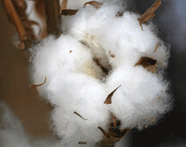Green is the New Black

What you need to know about organic clothes
We’ve all heard about the importance of being “green,” recycling, using re-useable grocery bags, buying organic food, but did you know there is a “greener” way to dress your baby? Organic clothing is a healthy, safe choice that is beneficial to you, your baby and the environment.
What is Organic Clothing?
Organic clothing is made from natural materials such as organic cotton, bamboo and soy. When creating the clothing, companies use the least amount of energy possible to produce and distribute it. There are no pesticides or chemical fertilizers used on organic crops, and the growing and harvesting methods have a low impact on the environment. How does Organic Clothing Benefit My Baby?
As a mother, you understand how sensitive your baby is to the environment. Infants and children are particularly sensitive to the health risks posed by pesticides and chemicals in non-organic products because their internal organs are still developing. In relation to their body weight, infants and children eat and drink more than adults, possibly increasing their exposure to pesticides in food and water. By purchasing organic clothing, you are encouraging pesticide and chemicalfree farms, making the planet greener for your baby. Organic clothing cuts down on children’s exposure to toxins, both in the environment, and the amount of toxins they are potentially absorbing through their skin. Skin is the body’s largest organ, and a baby’s skin is thinner, more fragile and less resistant to bacteria and harmful substances in the environment than an adult’s. How Do I Care for Organic Clothes? Organic materials are durable, because they have not been broken down by chemicals. Simply wash in cold water and hang dry to conserve power, but organic clothing will survive a quick tumble-dry when you are in a rush!
Organic Materials
Organic Cotton
Organic cotton is softer, stronger, better cotton. Organic cotton is grown using natural fertilizers and no chemicals (pesticides, herbicides, fertilizers). Organic cotton lasts longer – it will survive several more washes than traditional cotton, and feels much softer against your baby’s skin.
Bamboo
Bamboo is nature’s fastest growing plant; it is 100 per cent biodegradable and naturally re-generative. Often referred to as organic cashmere; the silky material of bamboo is naturally anti-bacterial, and doesn’t trap moisture as easily as other materials. It also won’t cause allergic skin reactions, perfect for baby’s sensitive skin!
Soy
Soy protein fibre has natural antibacterial and UV radiation prevention properties as well as great moisture absorption. Babies’ skin has less melanin than an adult, and needs even more UV protection; soy material will help, along with plenty of sunscreen, for those few minutes your child is in the sun. Soy material also has a nice silky look and soft cashmere feel.
Did You Know…?
* Soy promotes circulation and also contains many amino acids the human body needs. By simply touching the skin, soy fabric activates collagen in the skin. Collagen is a protein in the skin responsible for strength and elasticity; loss of collagen causes wrinkles.
* Traditional cotton is one of the most chemically treated crops on the planet. To make one T-shirt from traditional cotton, it takes 1/3 of a pound of chemicals.
* Bamboo fabric is 100 per cent biodegradable.
* Bamboo is one of the world’s fastestgrowing plants, and a bamboo forest is able to reach maturity in about four years.
* Bamboo is naturally cooler in summer and warmer in winter than regular fabrics in the equivalent knit or weave.
* Soy fabrics provide protection against UV rays. This is a natural feature; it is part of the molecular structure of the soy fabric.
* India and Turkey are the two top producers of organic cotton in the world.
* Organic fibres are also made from materials such as corn, milk protein and crushed pearls.
* Bamboo and soy fabrics don’t fade as quickly as cotton does.
* Production of organic cotton increased 76 per cent between 2005-2006.
* Soy fibre is three times stronger than wool, and retains almost as much heat.



